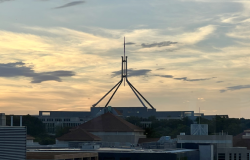How Egypt Unraveled: Two Wild Weeks
After months of tension, Egypt’s political crisis imploded July 3 when the army ousted President Mohamed Morsi, the only civilian president ever democratically elected in the Arab world’s largest country. The coup marked one of the most troubling turning points in modern Egyptian history, deepening the political schism.
After months of tension, Egypt’s political crisis imploded July 3 when the army ousted President Mohamed Morsi, the only civilian president ever democratically elected in the Arab world’s largest country. The coup marked one of the most troubling turning points in modern Egyptian history, deepening the political schism. The following is a chronology of key dates and events during the pivotal two weeks.
June 24: Army chief Abdel Fattah el Sisi (left) warned that the armed forces will not allow Egypt to fall into “a dark tunnel of conflict.”
“The armed forces have the obligation to intervene to stop Egypt from plunging into a dark tunnel of conflict and infighting... It is the national and moral duty of the army… to prevent sectarian strife or the collapse of state institutions.”
June 27: President Morsi marked one year in office by admitting mistakes and promising “radical and quick” reforms in a televised address.
“Political polarization and conflict have reached a stage that threatens our nascent democratic experience…The enemies of Egypt left no stone unturned in sabotaging the democratic experience… Enter elections if you want to change the government. Demonstrations are a means to express your opinions and not a tool to impose those opinions.”
June 29: Mohamed ElBaradei, head of the Constitution Party and coordinator of the opposition coalition National Salvation Front, urged Egyptians to protest the next day.
“We want another try at the ballot box… We gave him [Morsi] a driving license, and he couldn’t drive… The current revolution has erupted so that each one of us lives as human and be treated like human.”
Hamdeen Sabbahi, head of the Egyptian Popular Current Party and co-leader of the National Salvation Front, said the June 30 protest would mark a day “when Egypt will enforce its free will to build a future worthy of it.”
“We are with Islam and against the oppression of the Muslim Brotherhood. If the people enforce their wills in their peaceful millions, all state institutions, including the army, police and judiciary will take their side.”
June 30: Morsi rejected opposition calls for early presidential elections and his resignation, as millions took to the streets nationwide in rival demonstrations either demanding Morsi’s resignation or supporting him.Eight people were killed in clashes between the two groups outside the Muslim Brotherhood headquarters in Cairo.
“There is no room for any talk against this constitutional legitimacy. There can be demonstrations and people expressing their opinions. But what's critical in all this is the adoption and application of the constitution.”
July 1: The Tamarod (Rebel) movement issued a statement giving Morsi until 5 p.m. the following day to resign or risk facing “complete civil disobedience.” Before the June 30 protests, Tamarod had reportedly collected up to 22 million signatures for its petition demanding early elections.
“There is no alternative other than the peaceful end of power of the Muslim Brotherhood and its representative, Mohammed Morsi.” The statement urged “state institutions including the army, the police and the judiciary, to clearly side with the popular will as represented by the crowds.”
Several ministers resigned as demonstrations continued nationwide. General el Sisi called on the Morsi government to resolve the political crisis within 48 hours or face military intervention.
“If the demands of the people are not met within that time period [48 hours], then we will be obliged to fulfill our historical duty towards our country and the great people of Egypt to map out a future plan for the country in accordance to the demands of the Egyptian people and with the contribution of all aspects of the population, especially the youth who have proven themselves time and time again, and without exclusion of any political party.”
But in a second statement, the army rejected accusations that it was planning a coup.
“The doctrine and culture of the Armed Forces do not allow the adoption of any ‘military-coup-based’ policies… The aim of the Armed Forces’ [previous] statement is to push all political parties nationwide to quickly find solutions for the current crisis and reach a formula of national compromise that complies with the demands of the Egyptian people.”
Tamarod spokesperson Mahmoud Badr welcomed el Sisi’s statement.
“The army responding to the demands of the people crowns our movement.”
The Salafi Call movement and its political arm, al Nour, called on Morsi to set a date for early presidential elections and form a technocratic government in the interim.
“Despite our support for legitimacy, the interests of the nation and the perils of bloodshed should be taken into consideration...a balance has to be struck between interests and evils as well as between ability and incapacity… Legitimacy calls for preventing civil war and not just remaining in power.”
July 2: With momentum building toward new protests the next day,Muslim Brotherhood spokesman Mohamed al Beltagui called on Morsi’s supporters to oppose military action.
“Seeking martyrdom to prevent this coup is what we can offer to the previous martyrs of the revolution.”
Both Muslim and Christian clerics welcomed the largely peaceful nature of the protests so far.
Ahmed al Tayeb, the head of Al Azhar, Sunni Islam’s highest authority:
“People have surprised and inspired the world through its elegant expression of their peaceful demands…Unity of the Egyptian people is above all… Division will lead the country to a catastrophe, and it must end.”
Coptic Christian Pope Tawadros II lauded the anti-government protestors:
“It is wonderful to see the Egyptian people taking back their stolen revolution in a peaceful way.”
But in a late-night speech, Morsi refused to step down. He pounded the podium while accusing loyalists of former President Hosni Mubarak of trying to thwart democracy.
“If the price for safeguarding legitimacy is my blood, then I am prepared to sacrifice my blood for the cause of safety and legitimacy of this homeland.”
July 3: After a delay of several hours, army chief el Sisi announced Morsi’s ouster and the appointment of Supreme Constitutional Court Chief Justice Adly Mansour as interim president.El Sisi also suspended the constitution and said new elections would be held.
“The Egyptian Armed Forces first declared, is still declaring and will always declare that it stands distant from political forces. The Armed Forces, based on its insightfulness, has been called by the Egyptian people for help, not to hold the reins of power, yet to discharge its civil responsibility and answer demands of responsibility… The army has called for national dialogue, yet it was rejected by the presidency in the last moment. Many calls, initiatives followed until to date.”
Morsi’s official Facebook page angrily denounced the coup.
“It is completely rejected by every free citizen of the country who struggled to turn Egypt into a civil, democratic society… Commanders and soldiers alike must adhere to the constitution and the law, and not respond to this coup which will drag Egypt backwards, and they must act peacefully and avoid taking part in shedding the blood of citizens.”
More than 14 people were killed in clashes between pro-government and anti-Morsi protestors after the army’s announcement. Top officials from Morsi’s Freedom and Justice Party were also arrested. Some 300 arrest warrants were reportedly issued for Brotherhood members.
July 4: Chief JusticeMansour was sworn in as interim president.He applauded youth for mobilizing the June 30 protests, calling them the embodiment of Egypt’s “conscience, its ambitions and hopes.”
“The most glorious thing about June 30 is that it brought together everyone without discrimination or division. I offer my greetings to the revolutionary people of Egypt.”
July 5: Muslim Brotherhood supporters held “Day of Rejection” protests in major cities, asMansour dissolved the upper house of parliament, the last legislative body.
July 6: Political divisions emerged among the opposition over a new government, particularly the acceptability ofMohamed ElBaradei as interim prime minister. The ultraconservative Salafi al Nour Party emerged as the political kingmaker.
The head of al Azhar demanded the release of political prisoners, warning that Islam prohibits violence and killing. He urged Egyptians to find a way out of “this ugly strife.”
“I tell all those who contribute to bloodshed, this whole world is not worth a single drop of blood through unjust killing.”
July 8: At least 51 Morsi supporters were killed and more than 300 were wounded outside of the Republican Guard compound where Morsi was rumored to be held. Brotherhood spokesman Gehad al Haddad claimed that security forces opened fire while demonstrators were at pre-dawn prayers during a peaceful sit-in.
“We have people hit in the head. We have bullets that exploded as they entered the body, cluttering organs and body parts. Every police force in the world understands how to disperse a sit-in. This is just a criminal activity targeting protesters.”
The Brotherhood’s political wing, the Freedom and Justice Party, called for an uprising to protest the “massacre.”
“[The Freedom and Justice Party] calls on the great Egyptian people to rise up against those who want to steal their revolution with tanks and armored vehicles, even over the dead bodies of the people.”
The army claimed a “terrorist group” tried to storm the building. Interior Ministry spokesman Hany Abdel Latif said the security forces were working to safeguard the freedom of all Egyptians.
“The Egyptian police is the force of the people. The Egyptian police is out of the political equation. It can not be part of any political process in any way, shape or form.”
July 9: Interim President Mansour appointed former Finance Minister Hazem el Beblawi interim prime minister and named ElBaradei vice president. The Brotherhood rejected Mansour's six-month timetable for amending the constitution and holding parliamentary elections. Essam el Erian, deputy head of the Freedom and Justice Party posted the following reaction on Facebook.
"The cowards are not sleeping, but Egypt will not surrender. The people created their constitution with their votes."
The main opposition coalition, the National Salvation Front, rejected Mansour’s transition plan, claiming it was “in violation of previous promises” and lacked “significant clauses while others need change or removal.” The Tamarod (Rebel) movement also rejected the plan, which could pave the way for “a new dictatorship,” it warned on Twitter.
“It is impossible to accept the (constitutional declaration -- C.D.) because it founds a new dictatorship. We will hand over to the (military-installed caretaker) president an amendment to the C.D.”
Photo credit: General Abdel Fattah el Sisi via Facebook
Related Program

The Islamists
Learn more about Hamas and how it relates to similarly aligned organizations throughout the region. Read more










